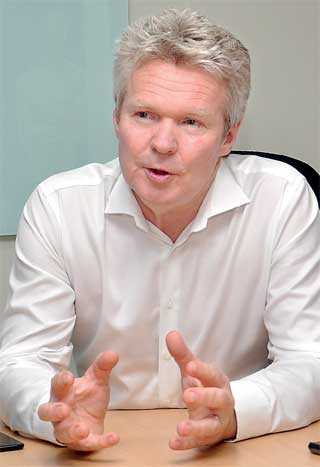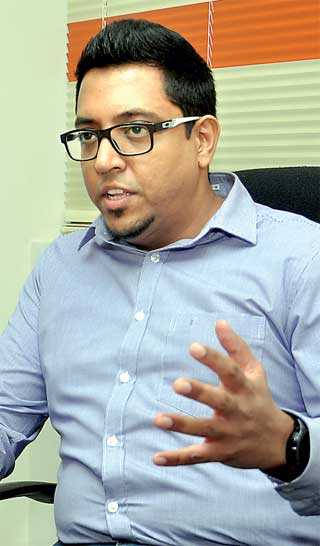Sunday Feb 22, 2026
Sunday Feb 22, 2026
Thursday, 7 March 2019 00:00 - - {{hitsCtrl.values.hits}}

By Charumini de Silva
99X Services Ltd., the managed IT services company, which offers infrastructure management, consultancy, application services and managed security services to predominantly Nordic companies recently changed its name to Visolit.
Upon changing the name, Visolit CEO Terje Mjøs and Visolit Sri Lanka Operations Country Manager Kushan Ratnapala took time off to speak to the Daily FT in an exclusive interview to discuss on the transition and future plans of the company.
Below are excerpts of the interview:
Q: Could you brief on the acquisition and company?
 |
Visolit Group CEO Terje Mjøs |
 |
Visolit Sri Lanka Operations Country Manager Kushan Ratnapala |
Mjøs: The Company that I am the CEO of used to be called TeleComputing, one of the largest cloud services operators in the Nordic region. We acquired seven businesses in 2018 which also include 99X Services which has Kushan and his 35-member team here in Sri Lanka. Since tele-computing is a bit old fashioned, we thought that we should conclude the changes including integration by changing the name for something that is more forward looking, modern and fresh. We had the process going and after so many advices we came up with this great idea ‘Visolit’ which actually means ‘we solve IT’. When it comes to integration of different companies including 99X and the team has been going on since last summer and is progressing well. The first phase is concluded by changing the name to Visolit recently.
Q: What made you all think it was the right time to invest in Sri Lanka?
Mjøs: We acquired a company which has already invested in Sri Lanka. Of course this is the first time we are here in Sri Lanka to better understand the team and the working environment. We have found that there is a great talent pool and it is possible that there is potential to attract more talent into our business. We want the team in Sri Lanka to double the activities and double the number of people by the end of 2020. There will be more customers to their portfolio apart from the over 40 customers they are serving in Norway. The market potential for Kushan and team has grown from $ 100 million to 2.5 billion so it is 12 times larger and the first phase is to double the activities in Sri Lanka. Visolit team in Sri Lanka has already expressed their confidence that the given targets are achievable and seeing the potential we thought it was worthwhile to invest here to attract more talent because it is a scarce resources in the Nordics. So, we believe it’s possible to attract more talent from Sri Lanka. We will continue to invest here in Sri Lanka. The first visit of us has been very fruitful and all the questions we had has been answered in a positive way.
Q: What is the contribution from Sri Lanka to the $ 50 billion?
Kushan: Currently Sri Lanka is only accounting to around Rs. 200 million, but this is just the start and we haven’t really commenced the integration process yet and once we kick off then it opens up a massive market for us. At present we are servicing only 40 customers, but once the integration is done there is potential to service over 1,200 customers, which will definitely increase the volume that we deliver from Sri Lanka.
The Government has identified IT/BPO sector has been categorised as a key sector in the National Export Strategy (NES), which needs to be supported. The telecommunication and electricity costs are actual issues for us and importation of devices and equipment has a lot of red tape which needs to be eased off to encourage investments. We need our law makers to look at these bureaucracies and streamline these areas to create a conducive environment to attract foreign investments – Visolit Sri Lanka Operations Country Manager Kushan Ratnapala
Mjøs: He just mentioned on the Norwegian companies, we also have a big operation in Sweden and after the first phase this will open up new markets for another 1,500 customers. It is a lot of opportunities for Kushan and his team. The first phase of doubling the activities is not easy, you have to work for it, but it is achievable.
Kushan: If you look at 99X Services we have been in operation from 2009 as a part of our sister company 99X technologies. But since then we have been increasing our presence and slowly developing. However, now we are in a much mature level to take on these challenges. From 2013, we went on our own as 99X Services and we were developing the IT service sector and therefore, I think this is coming to us in the right time.
Q: When you say there will be more opportunities, in which areas are you all looking at in the next five years?
Kushan: Our concentration is on the IT service. When we normally talk about IT, in Sri Lanka it is all about the software side of we look at, but here our main focus is on IT services. We are not limited to one area of technology, but within the IT scope we will go into any service that has potential to be delivered from Sri Lanka.
Q: What are your observations on Sri Lankan talent and what areas that Sri Lanka can improve on especially, in terms of capacity building?
Mjøs: We met all the team members in Sri Lanka and we understood their fortes. We also got to know that the clients they serve in Norway and they are highly satisfied with the talent pool here in Sri Lanka. In IT services, the crucial factor is to make sure that the system is always up and the team here is helping and making sure that everything is up and running when people are sleeping in Norway.
Kushan: We have recognised the risk of our talent pool as the number of graduates that are being pushed out from the local university systems are not sufficient. There is a clear need in the industry to increase the number of graduates, but for the current requirement we can meet the immediate targets with the remaining talent. However, we cannot be satisfied with it. We need to push the Government and all stakeholders to invest on capacity building.
Q: What is the game plan to double the activities by end 2020?
Kushan: One of the key strategies is on smart utilisation of resources. We have heavily invested on the automation part as well, so we want to get maximum out of our employees. Rather than just increasing the headcount we want to increase the value we create which is something we have been doing over the years. So efficiency is something we are pushing on and the growth will be a controlled one. We will only increase the headcount as necessary. Although we want to double our presence it doesn’t necessarily be a mode of increasing the headcount but through value proposition. We invest heavily on talent development. We also have an exchange program where we send our employees to Norway and Norwegian counterparts to come to Sri Lanka and work with each other. In addition, we are looking at building close relationship with the local universities to offer intern programs. Our existing talent pool is a mix of both State universities and private universities, therefore when we go into partner with universities we will look at it from that broad prospective.
Q: Retention of talent is a big challenge to many companies, what’s it like for you all?
Kushan: Actually, our retention is much better than the industry average. However, I agree that brain drain is one of the biggest problem that many companies are facing and it is something we need to look at not only from a company’s perspective, but also from a country perspective. To retain our talent we offer the maximum benefits we can and it is not only through the salaries but also through the culture we offer to them. We also have a close culture in our company.
Q: You mentioned that all took over seven companies last year and was Sri Lanka’s 99X services the only South Asian company?
Mjøs: Yes, 99X Services was the only South Asian or Asian company we acquired while the balance six companies were from Norway and Sweden. We will not invest in another company in Sri Lanka, but will stick with this team. However, we will continue to grow with acquisition in Norway and Sweden and Nordic countries.
Q: As an investor how was your experience in doing business in Sri Lanka?
Mjøs: I haven’t done much business here, but it has been quite pleasant. Being a socially responsible company we are committed to pay all required taxes, but we urge that the policies be more predicable for the business community. What we learned is that in Sri Lanka these policies keep on changing time to time and it is not a good climate to do investments. This is one area we will carefully look into.
Visolit team in Sri Lanka has already expressed their confidence that the given targets are achievable and seeing the potential we thought it was worthwhile to invest here to attract more talent because it is a scarce resources in the Nordics. So, we believe it’s possible to attract more talent from Sri Lanka. We will continue to invest here in Sri Lanka. The first visit of us has been very fruitful and all the questions we had has been answered in a positive way – Visolit CEO Terje Mjøs
Kushan: In terms of running a business I think there are certain bottlenecks we need to address, particularly in the IT sector. The Government has identified IT/BPO sector has been categorised as a key sector in the National Export Strategy (NES), which needs to be supported. The telecommunication and electricity costs are actual issues for us and importation of devices and equipment has a lot of red tape which needs to be eased off to encourage investments. We need our law makers to look at these bureaucracies and streamline these areas to create a conducive environment to attract foreign investments.
Q: What are your growth plans for this year?
Kushan: This year will be mostly preparation for us and perhaps from last quarter of this year to end of 2020 we will experience a significant growth.
Q: Anything else that you would like to add?
Kushan: I think it is a good opportunity for Sri Lanka to attract this type of good investors. I think we are largely looking at the IT software sector in Sri Lanka, but there is bigger opportunity in the IT services sector as well. We need to further explore our opportunities in the IT services sector to expand our presence in the global market share. There are few companies that are currently exploring on these lines, but I think there is much potential.
Mjøs: I also think the distance and time difference is also beneficial to serve Nordic companies. Distance is actually not good for other business, but in this instance it is actually beneficial services.
Kushan: The collaborative working environments are also really helping all our employees here in Sri Lanka and in Norway particularly in planning holidays and work schedules.
Pix by Ruwan Walpola